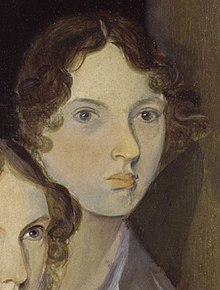Emily Brontë
Emily Jane Brontë (30 juillet 1818 Thornton – 19 décembre 1848 Haworth) est une poétesse et romancière britannique, sœur de Charlotte Brontë et d'Anne Brontë. Les Hauts de Hurlevent (Wuthering Heights), son unique roman, est considéré comme un classique de la littérature anglaise et mondiale.

Les Hauts de Hurlevent (1847)
modifier- (en) 1801 — I have just returned from a visit to my landlord — the solitary neighbour that I shall be troubled with. This is certainly a beautiful country! In all England, I do not believe that I could have fixed on a situation so completely removed from the stir of society. A perfect misanthropist's Heaven — and Mr. Heathcliff and I are such a suitable pair to divide the desolation between us.
- Les Hauts de Hurlevent (1847), Emily Brontë (trad. Frédéric Delebecque), éd. Payot, 1929, t. I, chap. I, p. 1 (texte intégral sur Wikisource)
- (en) "Wuthering" being a significant provincial adjective, descriptive of the atmospheric tumult to which its station is exposed in stormy weather. Pure, bracing ventilation they must have up there at all times, indeed: one may guess the power of the north wind blowing over the edge, by the excessive slant of a few stunted firs at the end of the house; and by a range of gaunt thorns all stretching their limbs one way, as if craving alms of the sun.
- Les Hauts de Hurlevent (1847), Emily Brontë (trad. Frédéric Delebecque), éd. Payot, 1929, t. I, chap. I, p. 2 (texte intégral sur Wikisource)
Poètes d'aujourd'hui, 1964
modifierJe vois descendre un soir encor plein de nuages
Après la longue pluie;
Les montagnes, à l'horizon
Se voilent de brumes d'été;
Brumes de rêve, brumes bleues...
Plus dense que toute rosée,
L'eau fait ployer les longues herbes;
Des parfums indécis flottent autour de moi
Ramenant les jours d'autrefois.
- Poètes d'aujourd'hui, Emily Brontë, éd. Pierre Seghers, 1964, p. 97
À propos d'Emily Brontë et de ses œuvres
modifier- (en) She should have been a man – a great navigator. Her powerful reason would have deduced new spheres of discovery from the knowledge of the old; and her strong imperious will would never have been daunted by opposition or difficulty, never have given way but with life. She had a head for logic, and a capability of argument unusual in a man and rarer indeed in a woman... impairing this gift was her stubborn tenacity of will which rendered her obtuse to all reasoning where her own wishes, or her own sense of right, was concerned.
- Constantin Héger (professeur d'Emily à Bruxelles en 1842) dans une lettre à Mrs. Gaskell.
- The Oxford History of the Novel in English, Collectif (trad. Wikiquote), éd. Oxford University Press, 2011, t. III, p. 208
- (en) Emily Bronte was a wild, original, and striking creature, but her one book is a kind of prose Kubla Khan, — a nightmare of the superheated imagination.
- Studies in Early Victorian Literature, Frederic Harrison (trad. Wikiquote), éd. Edward Arnold, 1895, chap. 7, p. 150
- (en) Wuthering Heights is known throughout the world as a great love story, yet film posters have billed it as ‘Emily Brontë's great story of hate’.
- Introduction par Patsy Stoneman.
- Wuthering Heights (1847), Emily Brontë (trad. Wikiquote), éd. Oxford University Press, 1998, chap. introduction, p. 1
Citations au sujet d'Emily Brontë
modifierThe Kick Inside, album, 1978
modifierTrop longtemps j'ai erré dans la nuit.
Je reviens à son côté, pour mettre les choses en ordre.
Je suis de retour aux Hauts de hurle, hurle,
aux Hauts de Hurlevent,
Heathcliff, c'est moi, ta Cathy, je suis de retour à la maison. J'ai si froid,
Laisse-moi entrer par ta fenêtre.
- (en)
Too long I roamed in the night.
I'm coming back to his side, to put it right.
I'm coming home to wuthering, wuthering,
Wuthering Heights,
Heathcliff, it's me, your Cathy, I've come home. I'm so cold,
let me in-a-your window.
- Wuthering Heights, Kate Bush (trad. Wikiquote), Kate Bush, album The Kick Inside (1978 chez EMI).